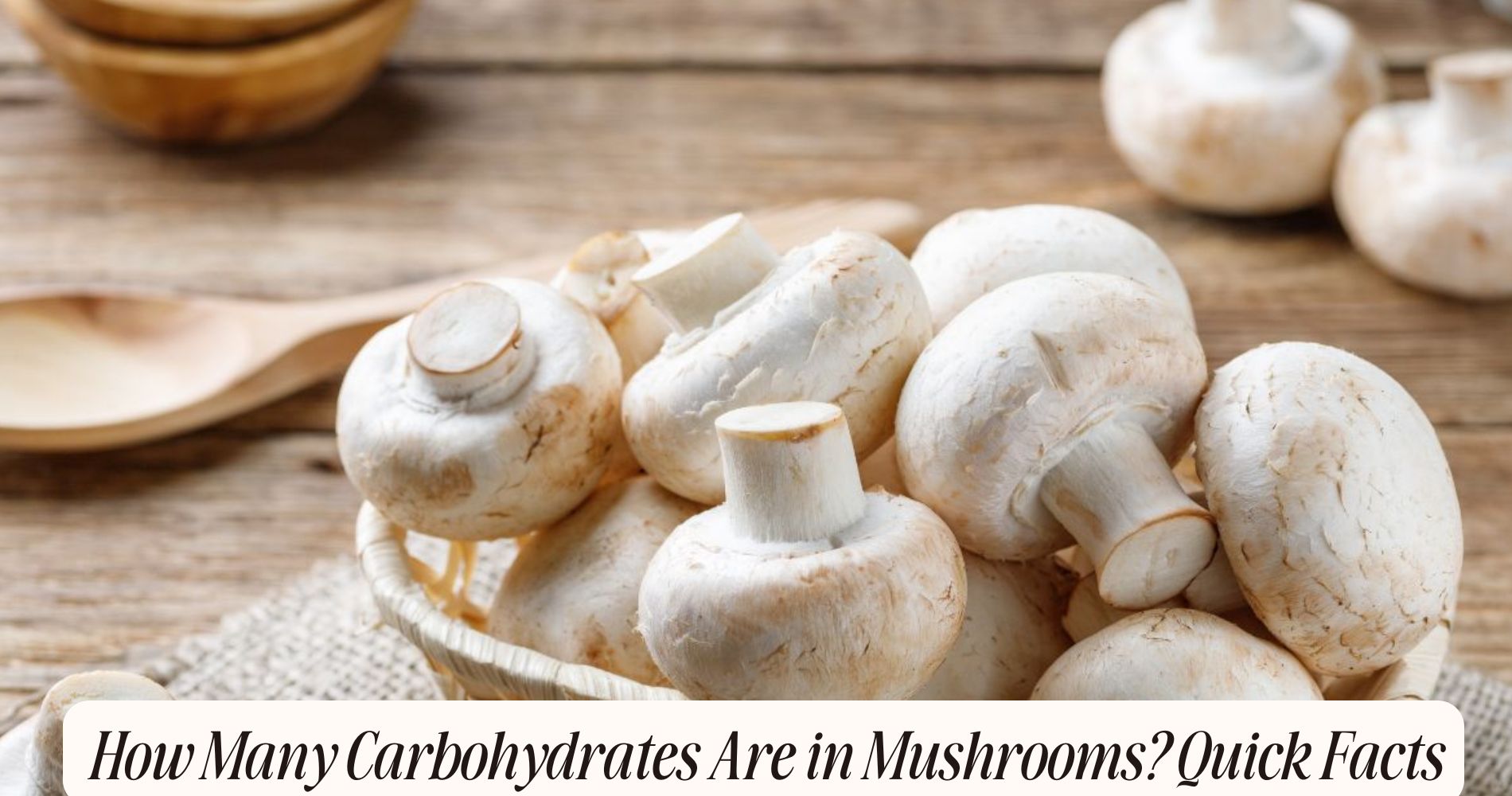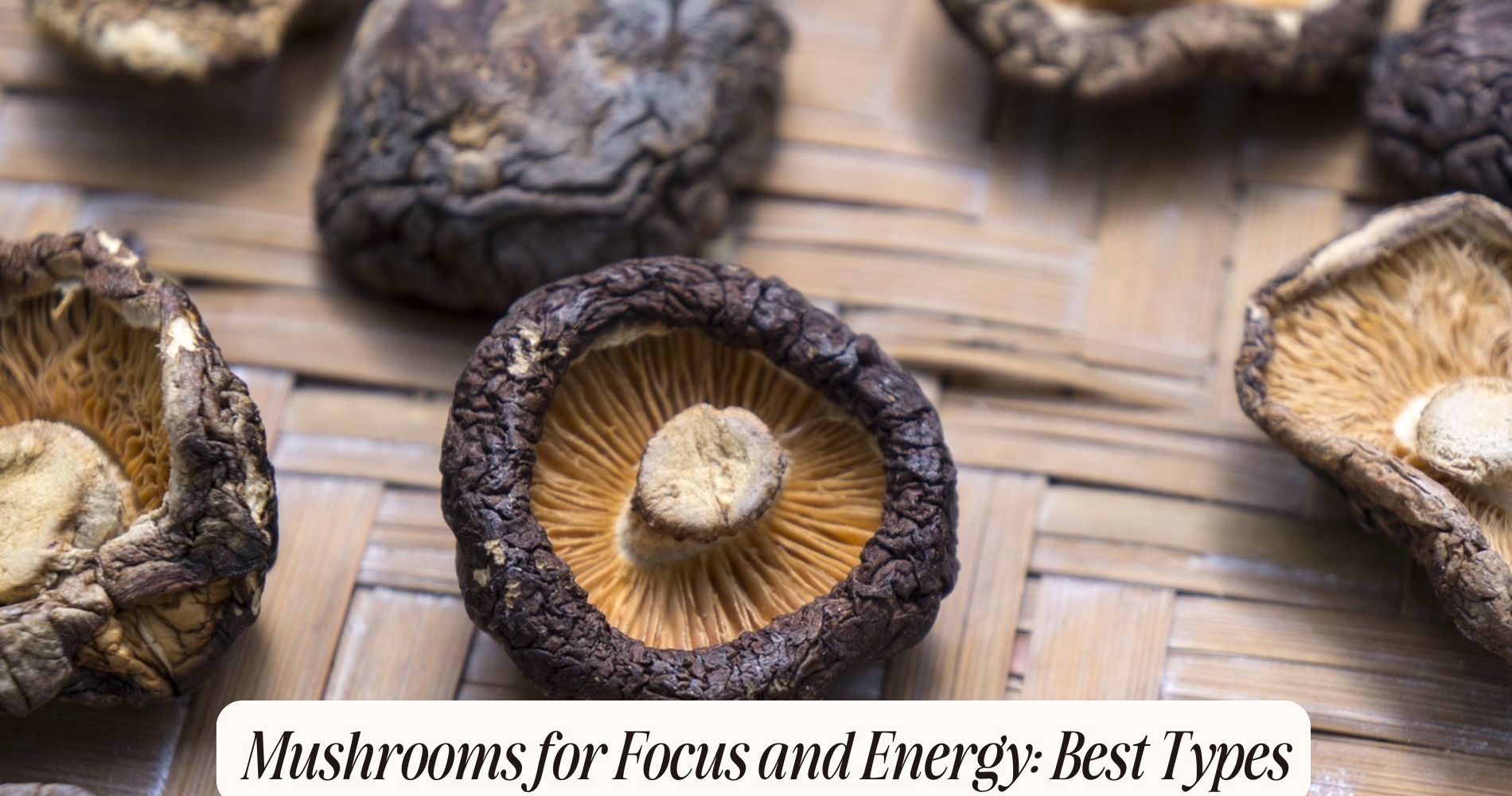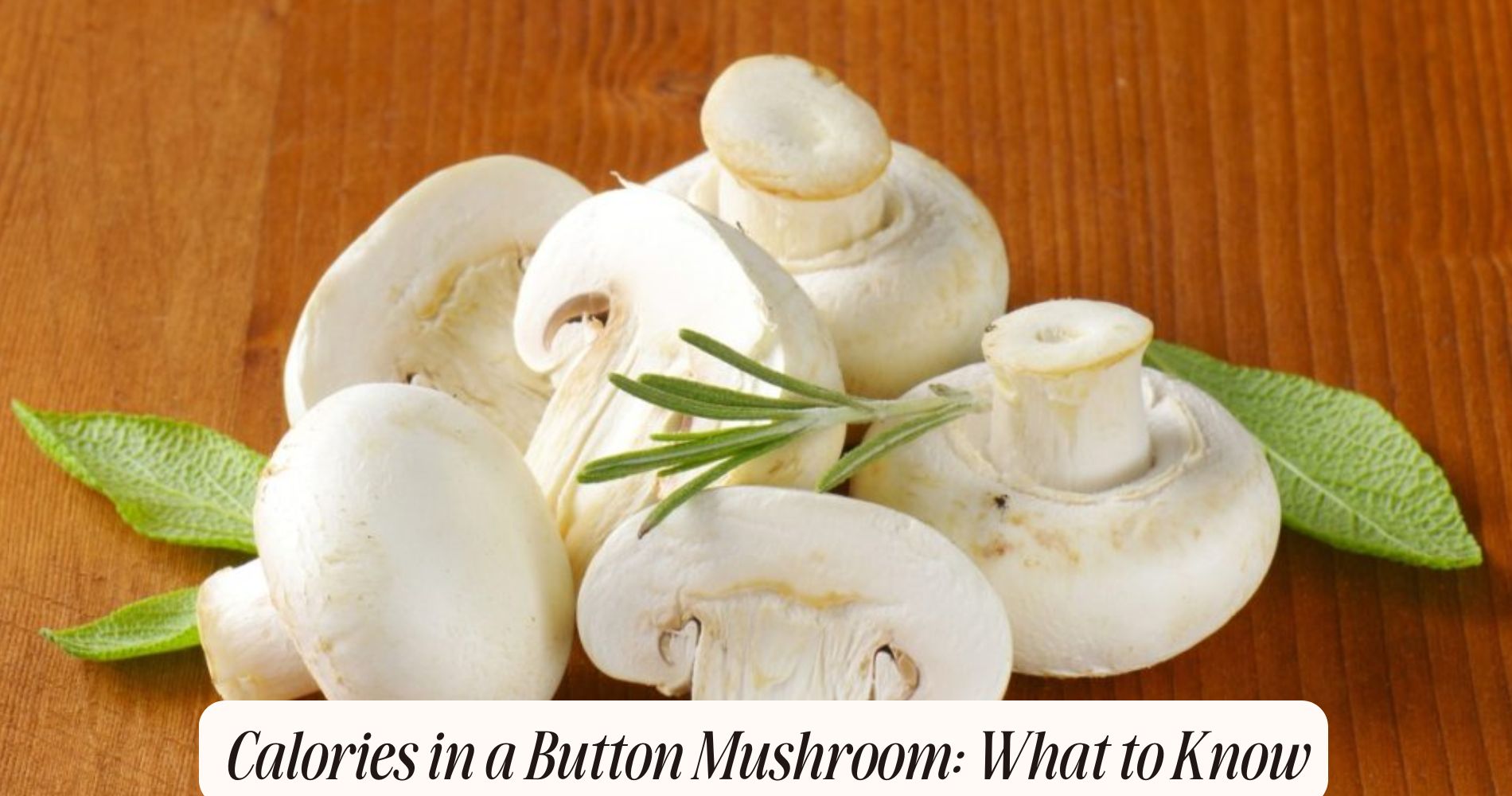
How Many Carbohydrates Are in Mushrooms? Quick Facts
How many carbohydrates are in mushrooms? Mushrooms pack around 2-3 grams of carbohydrates per cup, which makes them a top low-carb option for your meals. Most of these carbohydrates are non-starch, providing about 1 gram of dietary fiber that aids digestion and supports gut health. This low carb count varies slightly among different mushroom types, but overall, they're ideal for low-carb diets. Plus, their nutritional profile includes essential vitamins and minerals, boosting their health benefits. If you're curious about the various ways to incorporate mushrooms into your meal plan, you might find some tasty ideas ahead.
Nutritional Overview of Mushrooms
Mushrooms are often overlooked as a nutritional powerhouse, but they pack a significant punch when it comes to health benefits. You might be surprised to learn that various mushroom varieties, such as shiitake, portobello, and oyster, offer unique health advantages. These fungi are low in calories and fat, making them an excellent addition to your diet.
Rich in antioxidants, mushrooms help combat oxidative stress and inflammation in your body. They're also a good source of vitamins and minerals, including B vitamins, selenium, and potassium. If you're looking to boost your immune system, certain types, like reishi and maitake, are particularly noted for their immune-enhancing properties.

When it comes to culinary uses, mushrooms are incredibly versatile. You can sauté them, grill them, or toss them into soups and salads for added flavor and texture. They can even serve as a meat substitute in various dishes, thanks to their umami flavor.
Whether you're a fan of earthy chanterelles or the delicate taste of enoki, incorporating different mushroom varieties into your meals can enhance both your nutrition and your culinary experience.
Carbohydrate Content by Type
When it comes to carbohydrates, mushrooms offer a unique profile that sets them apart from many other vegetables. Unlike starchy vegetables, mushrooms primarily contain non-starch carbohydrate types, with a considerable portion being fiber. On average, a cup of raw mushrooms has about 2-3 grams of carbohydrates, out of which roughly 1 gram is dietary fiber. This low carbohydrate content makes them an excellent option for those monitoring their carb intake.
The fiber content in mushrooms is particularly remarkable. They contain both soluble and insoluble fiber, which can aid in digestion and help maintain a healthy gut. Soluble fiber can help regulate blood sugar levels, while insoluble fiber promotes regular bowel movements.
Additionally, different mushroom varieties can have slight variations in carbohydrate types. For instance, shiitake mushrooms may contain slightly more carbohydrates than button mushrooms, but the difference is minimal.
Health Benefits of Mushrooms
Mushrooms are packed with nutrients, making them a great addition to your diet.
They support your immune system and provide antioxidant properties that help combat oxidative stress.
Understanding these benefits can help you make informed choices about incorporating mushrooms into your meals.
Nutrient Density Explained
If you're looking to boost your diet with nutrient-rich foods, mushrooms should be on your radar. These fungi are packed with a variety of essential nutrients, making them an excellent choice for anyone seeking nutrient density. They're low in calories yet high in vitamins and minerals like B vitamins, selenium, and potassium.
Mushrooms offer remarkable nutrient diversity, which means they provide a wide range of beneficial compounds. This diversity can enhance your overall nutrient absorption. For instance, the presence of certain antioxidants in mushrooms can improve the body's ability to absorb essential nutrients from other foods, creating a synergistic effect.

Moreover, mushrooms are a great source of dietary fiber, which supports digestive health and can help regulate blood sugar levels. By incorporating mushrooms into your meals, you can easily add flavor and texture while reaping the health benefits.
Whether you sauté them, add them to salads, or include them in soups, mushrooms are a versatile ingredient that contributes considerably to your nutritional intake.
Immune System Support
The immune-boosting potential of mushrooms is impressive, thanks to their unique compounds that enhance your body's defense mechanisms. Certain mushroom varieties, like shiitake and maitake, are rich in beta-glucans, which are known to modulate immune responses. These polysaccharides stimulate the activity of white blood cells, helping your body fend off infections more effectively.
Additionally, mushrooms contain polysaccharopeptides, which have been shown to improve immune function. Research indicates that these compounds can increase the production of cytokines, signaling molecules that guide immune responses. By incorporating these mushrooms into your diet, you're not only enjoying their flavor but also harnessing their potential as immune boosters.
Moreover, the vitamin D content in some mushrooms, particularly when exposed to sunlight, contributes to immune support. Vitamin D plays an essential role in enhancing the pathogen-fighting effects of monocytes and macrophages, key players in your immune system.
Antioxidant Properties Highlighted
Packed with antioxidants, mushrooms offer a powerful defense against oxidative stress, which can lead to chronic diseases. These fungi contain various antioxidant compounds, such as ergothioneine and selenium, that help neutralize harmful free radicals in your body.
By incorporating mushrooms into your diet, you can enhance your overall health and potentially reduce the risk of conditions like heart disease and cancer.
Research shows that the antioxidant properties of mushrooms can also support your immune system. The presence of these compounds helps combat inflammation, which is linked to numerous health implications.
Regularly consuming mushrooms may contribute to better health outcomes by lowering oxidative damage and improving cellular function.
Additionally, specific types of mushrooms, like shiitake and maitake, are particularly rich in these beneficial compounds. By adding them to your meals, you not only boost flavor but also considerably enhance your antioxidant intake.
Mushrooms Vs Other Vegetables
When comparing mushrooms to other vegetables, it's clear that they offer unique nutritional benefits, particularly regarding carbohydrate content. Most mushroom varieties, like button, shiitake, and portobello, contain fewer carbohydrates than many starchy vegetables such as potatoes and corn. This makes them an excellent choice for those looking to reduce their carb intake while still enjoying a flavorful addition to meals.
In vegetable comparisons, mushrooms stand out not just for their low carb count but also for their high fiber content. While some vegetables provide more fiber, mushrooms contribute to digestive health without the excess calories. Additionally, they're low in fat and calories, making them a suitable option for weight management.

Moreover, mushrooms are rich in vitamins and minerals, such as B vitamins, selenium, and potassium, which can be less abundant in other vegetables. This nutrient density enhances their appeal as a dietary staple.
Whether you prefer them sautéed, grilled, or used in soups, incorporating various mushroom varieties into your diet can help you achieve a balanced and nutritious meal plan while keeping your carbohydrate intake in check.
Cooking Methods and Carbohydrates
When you cook mushrooms, the method you choose can impact their carbohydrate content.
Boiling may cause some water-soluble nutrients to leach out, while grilling can enhance flavor without greatly altering carb levels.
Baking, on the other hand, can lead to a slight reduction in carbohydrates due to moisture loss and caramelization.
Boiling and Carbohydrate Content
Boiling mushrooms can greatly affect their carbohydrate content, an essential factor for those monitoring their diet. When you boil mushrooms, the boiling effects can lead to a change in their overall nutrient profile, including carbohydrates. Studies show that boiling can result in some carbohydrate loss, particularly when mushrooms are submerged in water for extended periods.
Typically, mushrooms contain around 3-4 grams of carbohydrates per 100 grams. However, the boiling process may cause some of these carbohydrates to leach into the water, therefore reducing their retention in the final dish. If you're aiming for maximum carbohydrate retention, try to limit boiling time to just a few minutes.
You can also consider using the boiling water in soups or sauces to reclaim some of those lost nutrients.
Keep in mind that while boiling can diminish carbohydrate levels, it might enhance other beneficial compounds, such as antioxidants, by making them more bioavailable.
To conclude, if you're mindful of your carbohydrate intake, it's wise to pay attention to how long you boil your mushrooms and consider alternative cooking methods for better retention.
Grilling Effects on Carbs
Grilling mushrooms offers a different impact on their carbohydrate content compared to boiling. When you grill mushrooms, you're not just cooking them; you're also enhancing their flavor. Grilling techniques, like high-temperature direct heat, can caramelize the natural sugars in mushrooms, creating a rich, savory taste. This process may lead to a slight reduction in overall carbohydrate content, as some sugars convert to flavor compounds during grilling.
Unlike boiling, which can leach out some nutrients and flavors into the water, grilling retains more of the mushrooms' natural characteristics. The high heat causes water to evaporate, concentrating the remaining carbohydrates and other nutrients.

Additionally, the Maillard reaction, a chemical reaction between amino acids and reducing sugars that gives grilled foods their distinct flavor, further transforms the mushrooms.
It's important to note that the carbohydrate content remains relatively low overall. Grilling might slightly decrease or alter the carbohydrate profile, but the primary benefit lies in the enhanced flavor and texture.
Baking Nutritional Changes
Although baking is often viewed as a healthier cooking method, it can also influence the carbohydrate content in mushrooms. When you bake mushrooms, you're not just changing their texture and flavor; you're also altering their nutritional profile. The heat can break down some carbohydrates, making them easier to digest, but it may also concentrate them if moisture evaporates.
If you're looking to reduce carbohydrate intake, consider using baking alternatives like sautéing or steaming. These methods may preserve more of the mushroom's natural carbohydrate content while maintaining their nutritional benefits.
Additionally, when you're following a recipe, think about recipe substitutions. For example, instead of baking mushrooms with starchy fillers like breadcrumbs or pasta, you can pair them with fresh vegetables or low-carb grains, which can enhance flavor without adding too many carbs.
Ultimately, while baking can be a great way to prepare mushrooms, be mindful of how it interacts with their carbohydrate levels. By exploring different cooking methods and being strategic about your ingredient choices, you can enjoy mushrooms while keeping your carbohydrate intake in check.
Tips for Including Mushrooms in Diet
Incorporating mushrooms into your diet can be both delicious and nutritious. They're low in calories and carbohydrates while being rich in vitamins, minerals, and antioxidants. To make the most of their health benefits, try experimenting with various mushroom recipes. Add sautéed mushrooms to salads, omelets, or grain bowls for an earthy flavor and added texture.
If you're looking for dietary flexibility, mushrooms can serve as a meat substitute in many dishes. Use portobello caps as burger patties or slice them into stir-fries for a hearty addition. You can also blend finely chopped mushrooms into sauces, soups, and even meatloaf to boost nutrition without altering the taste markedly.
Don't forget to explore different varieties of mushrooms, like shiitake, oyster, or cremini, each bringing unique flavors and health benefits.

When shopping, choose fresh mushrooms, and store them in a paper bag in the refrigerator to extend their shelf life.
With these tips, you can easily incorporate mushrooms into your meals, enhancing both flavor and nutrition while enjoying the flexibility they offer in your cooking.
Low-Carb Boost with SUPER MUSHROOM GUMMIES
Looking for a convenient, low-carb way to enjoy the benefits of mushrooms? SUPER MUSHROOM GUMMIES from Well Gummies are the perfect solution. These delicious, vegan-friendly gum chews contain 10 powerful mushrooms, including reishi, designed to fuel your brain, energize your body, and support your immune system. With a fresh wild berry flavor, they provide calmer energy and sharper focus without any jitters or crashes. Enjoy all the benefits of mushrooms in a tasty, low-carb form that fits effortlessly into your daily routine!
Frequently Asked Questions
Are Mushrooms Suitable for Low-Carb Diets?
Yes, mushrooms are excellent low-carb options. With their low carbohydrate content and rich mushroom nutrition, they fit perfectly into low-carb diets, providing essential nutrients while keeping your carb intake in check. Enjoy them in various dishes!
Do Different Mushroom Varieties Have Varying Carbohydrate Levels?
Yes, different mushroom types do vary in carbohydrate levels. A carbohydrate comparison shows that while some, like shiitakes, have slightly higher carbs, others, like portobellos, are lower, making them suitable for various dietary preferences.
Can Cooking Affect the Carbohydrate Content of Mushrooms?
Cooking methods can affect the carbohydrate content of mushrooms. While some methods retain nutrients better, others might cause slight losses. It's crucial to choose your cooking technique wisely to maximize nutrient retention and maintain their health benefits.
Are There Any Mushrooms High in Carbohydrates?
While most mushrooms aren't high in carbohydrates, some types, like the king trumpet or certain wild varieties, can contain higher levels. Always consider these mushroom types if you're exploring alternative carbohydrate sources for your diet.
How Do Mushrooms Compare to Grains in Carbohydrate Content?
When you compare mushroom types to grains, mushrooms typically contain fewer carbohydrates. While grains are primary carbohydrate sources, mushrooms offer a low-carb alternative, making them ideal for those seeking to reduce their carbohydrate intake.
Conclusion
Incorporating mushrooms into your diet is a smart choice, especially if you're watching your carbohydrate intake. With low carbohydrate levels and a wealth of nutrients, they can enhance your meals while offering health benefits. Whether you opt for white, shiitake, or portobello, each variety contributes unique flavors and textures. By experimenting with different cooking methods, you can enjoy mushrooms in various dishes, making them a versatile addition to a balanced diet. So go ahead, savor their goodness!




